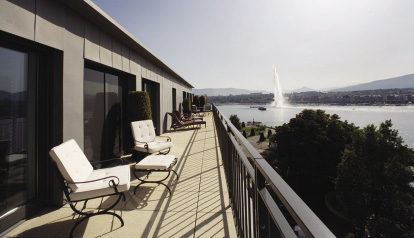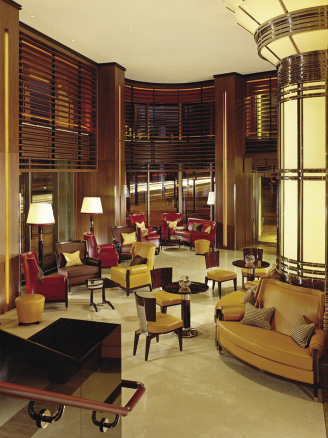- Home
- Media Kit
- Current Issue
- Past Issues
- Ad Specs-Submission
- Ad Print Settings
- Reprints (PDF)
- Photo Specifications (PDF)
- Contact Us

![]()
ONLINE

Hotels That Speak to History
Editors’ Note
Christopher Cowdray was appointed Chief Executive Officer of Dorchester Collection in 2007. Prior to that, he was General Manager of The Dorchester following a six-year stint as Managing Director of Claridge’s, London. Cowdray is a native of Zimbabwe, where he earned a diploma in hotel management. He is also a graduate of the executive program at Columbia University’s Business School.
Company Brief
Dorchester Collection (www.dorchestercollection.com) is the successor to the Dorchester Group, which was originally established in 1996 to manage a portfolio of some of the world’s most celebrated hotels. Dorchester Collection’s portfolio currently includes The Dorchester and newly opened 45 Park Lane in London, Coworth Park in Ascot, Le Meurice and Hôtel Plaza Athénée in Paris, Hotel Principe di Savoia in Milan, Le Richemond in Geneva, The Beverly Hills Hotel, and the recently reopened Hotel Bel-Air, which has undergone 24 months of extensive renovations.
What links the hotels in the Dorchester Collection portfolio and how has the Collection evolved?
We’re fortunate to have within the group some of the world’s most iconic landmark hotels with illustrious heritage and amazing reputations. It started with The Dorchester and we added The Beverly Hills Hotel, Le Meurice, and Hotel Plaza Athénée, and it has continued to evolve.
The Dorchester is celebrating its 80th anniversary this year. What makes a hotel iconic?
It’s many things: the location, how the hotel was built at the time, the legendary reputation it has earned, and ultimately, the clientele who enjoy the hotels. So that special combination creates the desire for people to visit.

Armleder Suite Terrace at
Le Richemond, Geneva
You’ve made investments in the properties, one being a major renovation of Hotel Bel-Air. What was your vision for that property and how did you retain some of its history while you were updating it?
We were aware of the incredible history of the hotel and though we wanted to move it forward, we also wanted to make sure we didn’t lose sight of the traditions and what made it the hotel it is. We listened to the feedback from our loyal guests and were sure to incorporate that into our plans.
It’s a tranquil sanctuary within the canyon and that has been retained with landscaping. At the same time, we’ve upgraded it – every room now has a beautiful modern bathroom and we have introduced state-of-the-art technology.
In terms of the food and beverage offering, we have added more variety to what was there before. So although we spent a lot of money on the property, a lot has gone into the behind-the-scenes elements as well as towards enhancing facilities. We have also added 12 rooms on the side of the canyon and also the spa, which has three suites as well. So we haven’t lost the hotel’s charm.
What was your approach to the renovation of 45 Park Lane in London?
It was slightly different. This property was built in the 1960s on Park Lane, so it already has an important presence within London. Given its age, we focused on the design being contemporary but luxurious and distinctive. It has 45 rooms and a penthouse suite with a wraparound terrace offering glorious views of London. Wolfgang Puck’s first restaurant in Europe, CUT at 45 Park Lane, is already proving extremely popular.
With the more recent addition of the Le Richemond, would you talk about that property and do you plan a major refurbishment?
Le Richemond is the oldest hotel in Geneva. Renovation was completed a few years ago and the public areas are not in keeping with the heritage of the hotel. So we will be remodeling the public areas – the welcome area, the restaurant, the bar – to bring it more in line with our other hotels.
We’ll be spending some money also upgrading some of the suites. But overall, the hotel is in very good condition – it just needs to be realigned.

The Lounge at
45 Park Lane, London
With the creation of Dorchester Collection, was it important that there be control over the number of properties taken on so as to maintain an intimate feel?
It’s a matter of finding properties that are going to fit within the company. We are not looking to grow to 50 or 60 hotels. If we can achieve 15 hotels by 2015, then we’ll have done extremely well.
It is challenging to find hotels that will meet our exact standards, so it will take time, but we’ll get there.
Is it important for you to be in certain markets where you’re not today?
We want to continue our growth in key cities in Europe and the U.S., as well as the Far East. So we see our growth predominantly coming through cities at this stage.
There are so many great stand-alone restaurants in cities where your properties are based. Is it challenging to be successful as a hotel restaurant?
There is no particular concept that works, but whatever concept we put into our hotel has to appeal to the local community as well as to the inhouse guests. We’re not just seen as a hotel within a city; we also want to be part of a community. Therefore, our food and beverage offerings are designed so that the local community is attracted to the hotel.
We work with a variety of award-winning chefs, like Alain Ducasse and Wolfgang Puck, to create excitement in our hotels and these are important to further cement our relationship with the community.
In the major cities where a few of your properties were built a long time ago and space is of the essence, how important is it to build a true spa experience?
A spa is absolutely critical and all of our hotels have spa access. The size of the spa is restricted by the space available, but it’s crucial to make sure we have a spa that has a variety of treatment and relaxation rooms where our guests can feel comfortable.
In offering all of the top technology, how do you ensure you don’t lose the hospitality side of the business?
True hospitality comes from the personal and interactive service you offer. It’s the people at the frontline who ensure that our guests receive that friendly, efficient welcome and are recognized and made to feel at home.
The telephone, Internet, and television are what the guests see; behind the scenes, you have all the technology that enables you to more effectively run your business. So we’re continually enhancing our technology to improve the guest experience; 45 Park Lane and Hotel Bel-Air are both examples of that.
In light of the economic crisis, have you seen the business come back or is it still volatile?
We have seen the business come back in all of our hotels. So we remain confident and expect a good year, and hope this continues into 2012.•